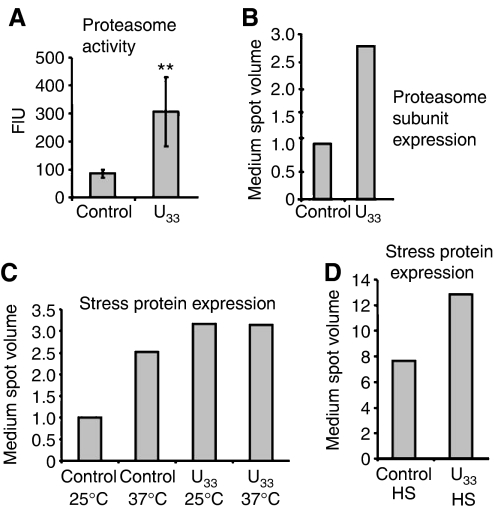Figure 5.
Genetic code alterations reprogramme the stress response. (A) Proteasome activity increased 3.6-fold in S. cerevisiae cells expressing C. albicans tRNACAGSer (U33), as shown by enhanced proteolysis of the chymotrypsin-like substrate SucLLVY-AMC. The results are expressed as mean±s.d. of 4–6 independent experiments (**P<0.01 by Student's t-test). Fluorescence intensity (FIU) is shown in arbitrary units. (B) Expression of proteasome subunits (Supplementary Table 3) was threefold induced by CUG ambiguity, as measured by proteome analysis. Control (C) and ambiguous (U33) cells were grown at 25°C (25), 37°C (37) or heat shocked (HS). Proteins were labelled in vivo with L-[35S]methionine and separated by 2D-PAGE as described in Materials and methods. The medium expression level of the selected proteins was calculated and normalized to the control to deduce general folds. (C) Ambiguity pre-adapted cells to tolerate adverse growth conditions. Expression of stress proteins (Supplementary Tables 3 and 4) increased twofold in control cells at 37°C, but not in ambiguous cells that already had increased amounts (3 fold) of these stress-protective proteins. (D) Ambiguous cells retained the capacity to respond to additional stress. Expression of stress proteins (Supplementary Tables 3 and 4) was induced in both strains under heat-shock (8- and 13-fold for the control and ambiguous cells, respectively).

